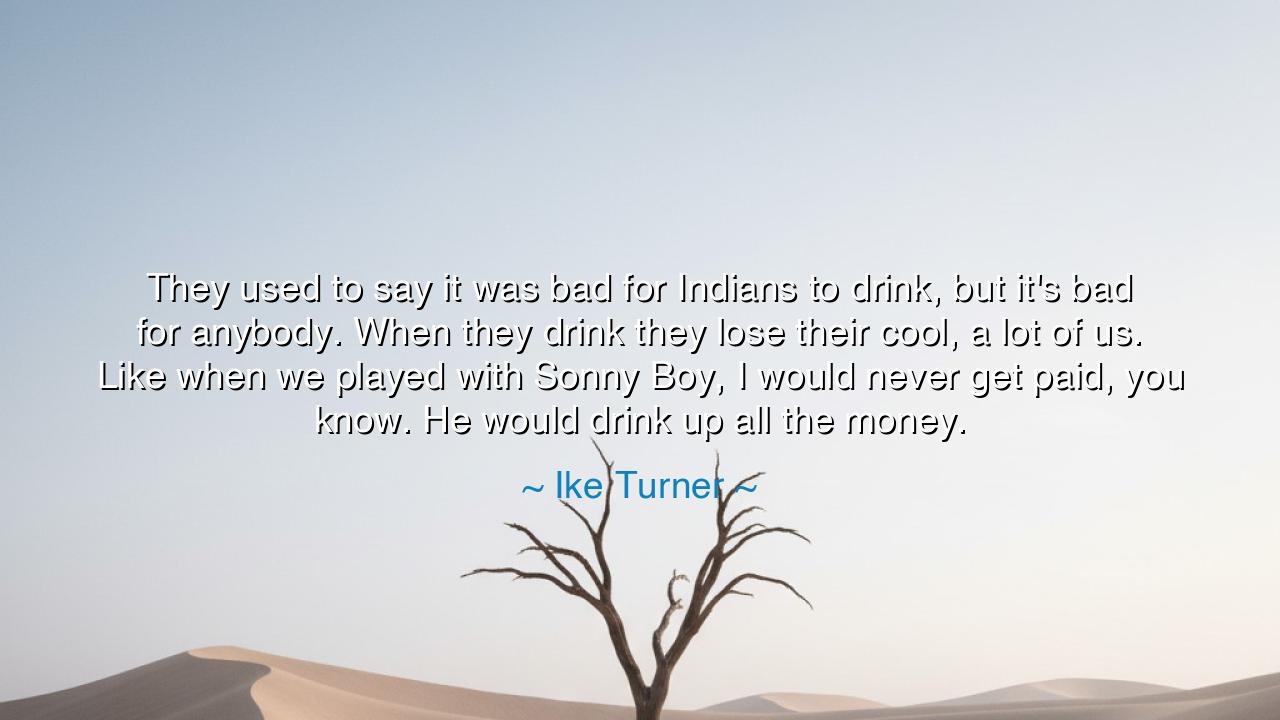
They used to say it was bad for Indians to drink, but it's bad
They used to say it was bad for Indians to drink, but it's bad for anybody. When they drink they lose their cool, a lot of us. Like when we played with Sonny Boy, I would never get paid, you know. He would drink up all the money.






In the darkened corners of the soul, there lies a force that, when harnessed, can create greatness, but when uncontrolled, can lead to ruin. Ike Turner speaks of a profound truth, one that echoes through the ages. "They used to say it was bad for Indians to drink, but it’s bad for anybody." These words are not merely a reflection of an individual’s struggles, but a timeless lesson on the dangers of addiction and the loss of self-control. The alcohol that Ike Turner refers to is a symbol, not just of the substance itself, but of the forces that can lead a person to lose their way, their dignity, and their purpose.
In ancient times, the sages warned of the dangers of indulgence, of losing one’s cool in the face of temptation. They understood that true strength lay not in the freedom to consume and indulge, but in the mastery of oneself. The great philosopher Socrates taught that a man who loses control of his desires is like a ship tossed upon the waves, at the mercy of every storm. Ike Turner’s lament speaks to the human condition—how, in moments of weakness, even the strongest among us can be reduced to shadows of our true selves, controlled not by reason but by the whims of desire.
Turner recalls the loss of his dignity in the company of Sonny Boy, another man who fell prey to the siren song of alcohol. "When we played with Sonny Boy, I would never get paid, you know. He would drink up all the money." This is not just a personal tragedy, but a universal one. The path of indulgence leads not only to the depletion of wealth, but to the erosion of one’s integrity and worth. Just as the prodigal son squandered his inheritance in a faraway land, those who lose their self-control often find themselves empty, penniless, and broken, not only in spirit but in substance.
The ancient teachings have long warned of the dangers of excess, whether it be in drink, desire, or ambition. It is said that Hercules, that great hero of myth, was undone not by the strength of his enemies, but by his own unchecked impulses. He was a man of great power, but in his reckless pursuit of pleasure, he was led astray. Just as the wise men of old recognized the danger of hubris, we too must recognize the danger of self-indulgence. When we give ourselves over to excess, we lose the ability to reason, to act with integrity, and to stay true to our highest self.
There is also wisdom in recognizing that this loss of control does not happen in isolation. Just as Ike Turner was impacted by Sonny Boy’s reckless behavior, so too are we all affected by the actions of those around us. In the company of those who live without restraint, we too may be drawn into a spiral of destruction. The ancient tribes understood this: they knew that the health of the individual is tied to the health of the community, and that a single misstep could bring ruin to all. Ike Turner’s struggle is not just his own, but a reflection of the shared responsibility we all have to one another to live lives of purpose and honor.
The lesson, then, is clear: to lose one’s cool, to be swept away by the tides of indulgence, is to lose the very essence of who we are. It is a tragic tale, but one with a powerful lesson. If we are to live lives of meaning, of dignity, and of self-respect, we must recognize the dangers of excess and the importance of self-control. Just as Ike Turner reflects on the destruction wrought by the abuse of alcohol, we must recognize the dangers of all forms of indulgence—whether they be in substance, ambition, or any other vice that can lead us astray.
To those who listen to this wisdom, the task is clear: master yourselves, for in self-control lies the true path to greatness. Seek not to drown your sorrows in fleeting pleasures, but instead, find the courage to face your demons with clarity and strength. The true power of the human spirit lies not in indulgence, but in the mastery of one’s desires. Let this be a lesson passed down through the ages: the greatest battles are fought not on the outside, but within. And the true warrior is the one who can remain calm, steadfast, and true, no matter the storm that rages around him.






AAdministratorAdministrator
Welcome, honored guests. Please leave a comment, we will respond soon